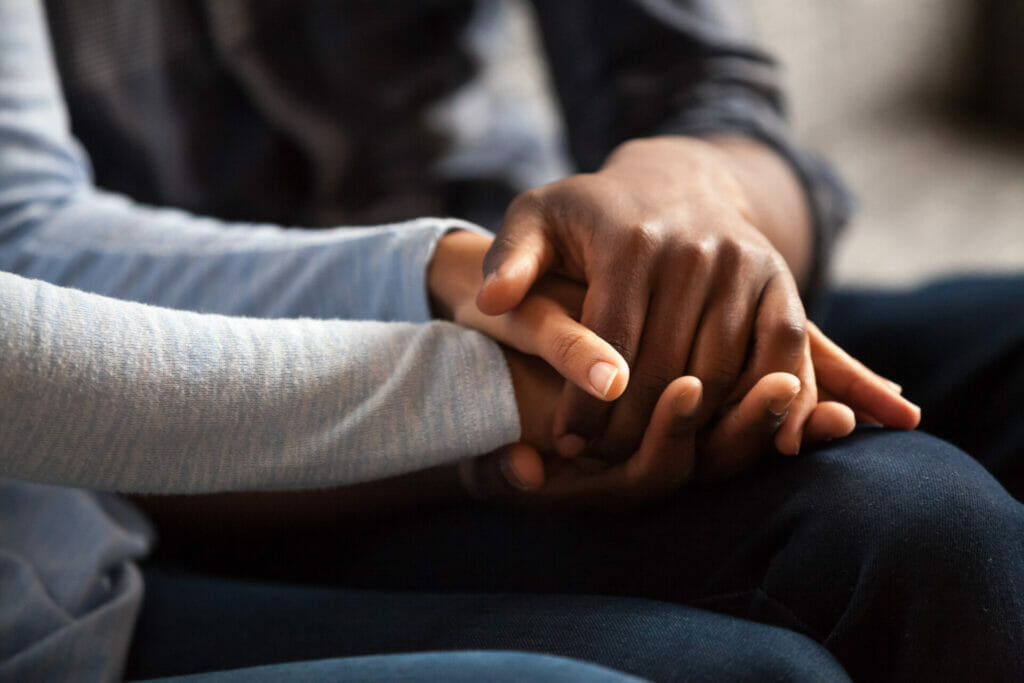When our companion animals pass, we naturally seek comfort from those closest to us. While it would be ideal to always receive the support we need, this is not always the case. Sometimes our grief is met with invalidation or apathy from the humans we love. In that case, we may experience shame and loneliness — in addition to other feelings that are not conducive to healing. We thus need to find ways to connect and communicate with loved ones effectively.
When grieving the loss of our pet, it is helpful to understand that our emotions influence our relationships, and our relationships influence our emotions. Below are several suggestions for engaging with loved ones during our bereavement period, followed by a journaling prompt to help provide insight into what you need from them.
Fostering Supportive Conversations During Grief:
Slow Down:
In discussions with loved ones, especially when they’re overwhelmed with grief, we’re often distracted or not fully present. It’s common to find ourselves waiting to chime in with our thoughts while our loved one is still speaking, especially if we’re feeling hurt by or defensive about what they’re saying. As a result, we don’t fully hear them. To change this reactive dynamic, 1) listen until they are quiet, 2) take a few deep breaths, and 3) respond.
Temporarily Postpone the Conversation:
Supportive discussion involves attempting to listen with an open mind. If we don’t have the bandwidth to do this, we may want to postpone the conversation until we do. Whenever you find your interactions escalating, take a brief break. Getting some fresh air by walking or sitting in a private, peaceful space can be calming. Please note if you decide to take a breather, it’s helpful to share your intentions with your loved one; it can ease the uncertainty of you (temporarily) leaving the situation.
Provide Encouraging Feedback:
A valuable way to share feedback is to restate what the other person says. We all appreciate validation. heard. While we don’t have to agree with what is being said, we want to show that we’re considering our loved one’s perspective to the best of our ability. It’s also completely acceptable to be transparent with this process. For example, you might say, “It sounds like you are concerned about me because I am so sad; do I understand you correctly?”
Ask Open-Ended Questions:
Rhetorical questions rarely prompt loving discussions. We continue to say these things, however, because they help us release our frustration and devastation, even while recognizing they are harmful to our hopes of reaching an understanding. Focus on open-ended questions when asking for help or something you need. For example, “I could use your help with _______; do you have any ideas for how we might do this?”

Tread Respectfully:
When something upsets you, attempt to approach it straightforwardly and without blame. The tone we use when communicating plays a significant role in resolving them. A mutually respectful tone is vital in creating a “safe space” to engage in open and honest dialogue.
Seek to Understand:
In disagreements, our deepest desire as humans is to be understood. Productive dialogue and properly communicating grief, however, involves making efforts to understand one another. Rather than repeatedly emphasizing our need to be heard, focus on understanding where your loved one’s perspective.
Use “I + XYZ” Statements:
You may have heard that using “I” statements when communicating grief (e.g., I feel, I need, I want) allows you to express your feelings effectively. Now try adding the “XYZ” technique: “I feel X when you do Y in situation Z.” For example: “I feel hurt when you tell me I should be over my loss by now when you see me crying.” This provides valuable context to your loved one about what you are thinking and how you are feeling. This also keeps the discussion contained to the specific situation rather than bringing in multiple variables, which can cause confusion and overwhelm.
Generously Share Appreciations:
In the healthiest interactions, each party feels valued and respected for who they are and the qualities they bring to the relationship. Try to identify what you appreciate about your loved one and share it with them. Clinical psychologist and researcher Dr. John Gottman, who studied relationship stability, found that individuals in supportive relationships make 5 times as many positive statements as negative ones when discussing their needs and concerns.
Strategies to De-escalate Hurtful Exchanges During Grief
Given that all relationships consist of two independently-functioning individuals with their thoughts and feelings, disagreements are inevitable, especially during grief periods. Research shows the strength of a relationship can evaluated by how the two disagree. Conflicts cultivate more respect and deepen bonds if approached with the shared objective of resolution and growth.
Validate Emotions:
We are all entitled to our feelings. If we do not fully understand loved ones’ views, recognize when they are upset. By communicating that you recognize this, you also affirm that their feelings are real and worthy of your time and attention.

Apologize (But Only If You Mean It):
When we take responsibility for our actions and behaviors, it demonstrates that we are sincere about making amends and moving forward. If we say “I’m sorry,” it should be genuine. It is also more meaningful to share exactly what we are apologizing for. For example, saying “I’m sorry for raising my voice to you” may go much further than “I’m sorry.”
Consider Your Loved One’s State:
Harder discussions should be held when both parties are fully present. Misunderstandings quickly escalate when one or both of you are tired, hungry, distracted, lonely, and/or stressed.
Strive to Find Common Ground:
If we feel invalidated, we tend to become rigid in our positions. A polarizing dynamic often results in loved ones believing they are entirely separate in their views. This perceived division often fuels many emotions, like hopelessness or resentment. In most cases, however, there is some aspect that both of you can agree on. Engaging from this shared space creates a foundation from which to proceed.
Finally, Attempt to Recognize What’s Underneath the Anger:
In disputes, anger often serves as a “secondary emotion,” meaning it protects an underlying, more vulnerable emotion, such as fear or abandonment. Sharing honest feelings, however, can leave us exposed and raw. Creating a safe space and showing up authentically will lead to mutual courage and will help you share what really needs to be addressed.
Journal Prompt:
If We Feel Our Loved Ones Either Don’t Understand Our Grief or Are Unsupportive
- Describe the situation – what exactly happened?
What had been my expectations of my loved one?
- What did I expect them to feel?
- What did I expect them to believe/think?
- What did I expect them to do?
What did I feel and believe about myself in response?
- What were my feelings?
- What were my thoughts/beliefs?
My Resulting Behavior
- What did I do? How did I react?
What did I learn?
- Realizations about myself and my loved ones.
Learning effective ways to interact with our family and friends during the grieving process is essential for secure relationships. It is important to talk to loved ones about your thoughts and feelings (and they influence your behavior). As with any new skill, repetition and time will help these skills become innate and effective.




















